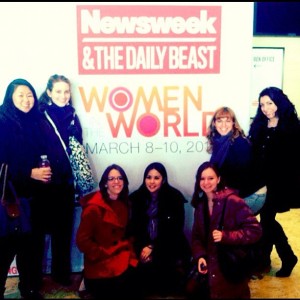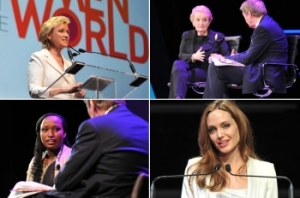Just a fair warning that this blog is probably going to be longer than a blog post is really supposed to be. However, after attending the 3 day Women In The World Summit, I can’t help but want to remember every moment and all of the inspired ideas and thoughts that I had throughout. This is going to be my documentation of it, but I promise everyt person and everything that happened at the summit is worth reading and learning about. Forgive me if my thoughts seem scattered, I’m trying to collect them through many many tweets. The whole reason I was there was because the Girls Who Rock team was invited, and throughout the whole event I was live tweeting for them (@girlswhorockny). It was an amazing experience! (When I wrote this I didn’t realize just how long it would be, so I have decided to break the summit down by day, this is day 1).
Friday, March 8th
The summit started out with Suma, an indentured servant from Nepal who was forced into work by her parents where she was treated as a slave and abused daily. She was a beautiful and strong young woman who came to sing her song to help those still suffering this treatment which is common among girls in Nepal after being sent by their own parents.
From there, the evening went into a panel on forced marriages, specifically in Europe. There is an organization there currently called the Forced Marriage Unit that girls can call if they suspect their parents will be taking them away to be married soon. The Forced Marriage Unit then tells the girls to put a metal spoon in their underwear so that when they go through airport security as their parents take them out of the country, they’ll set the alarm off. From there they will be taken into a private room and be given a chance to talk to someone one on one. However, as Lesley Stahl continued on with the panel, the horror does not end there. Most girls who do speak out against their forced marriage are then turned against by their parents. One woman on the panel, Jasvender Sanghera, hadn’t had contact with their families for decades. It is not uncommon for the cases to be even more extreme than that. Fathers will threaten suicide or divorce of the mother, abuse, or even murder. One woman on the panel had a sister who was constantly abused and raped by her husband she was forced to marry. At age 24 she went to her mother for help, but she refused saying if the woman did anything to ruin the marriage she would be a disgrace to the family. Shortly after, the young woman killed herself by setting herself on fire. The mother refused to let anyone in their family attend the funeral or speak of the young woman or her death again because she had dishonored the family. Stories like this have even come out of the United States. There was a case in Arizona where a mother burned her daughter’s face for refusing an arranged marriage. The awful connection these stories all have, no matter what country they come out of, are that the mothers and grandmothers are often the most brutal and show no remorse on the violence they afflict onto their daughters even if they end up in court for murder. How can a mother feel that way toward their own daughter? There have been 3000 cases of forced marriage in the United States in the past 2 years, but many many more that remain hidden.
Next up was a woman who I have admired for many many years. Madeleine K. Albright was interviewed by Charlie Rose. It was amazing to hear her life story and how she brought it with her into her career firsthand, and inspiring as she made it seem that any person no matter what background you have can have enormous success. She recalled her family who had passed away in concentration camps, which she only found out recently, and her personal experience in the Cold War as a child. “You have to remember those who perished to make a better life,” she said. She then related the Holocaust in Germany to the current situation in Syria today commenting on how people back in World War II claimed that they didn’t know what was happening in Germany, though she doesn’t buy that, but today we know everything that goes on everywhere and we have a responsibility to protect (R2P). Then the question I think is on many minds today was voiced-how many people have to die in Syria before we can intervene? It’s a thin line right now to a huge regret remembered for all of history such as what happened with Rwanda. Switching gears, Madeleine Albright began speaking about women in power and how there aren’t enough currently because if there was it would make a huge difference. “Some say there arent enough qualified women, thats the biggest load of bullshit I’ve ever heard,” she said. Then she gave a quote that would highlight throughout the rest of the summit: “There’s a special place in Hell for women who don’t help each other.”
Sandra Uwiringyimana, an 18 year old Congolese woman, told her experience of surviving the genocide in 2004 at age 10. From my past experience working on projects for positive change in Democratic Republic of Congo, it was heartbreaking to hear her story as she spoke of her family fleeing Congo to Burundi and witnessing the massacre that occurred along the way. “Justice needs to be fought for and it can come from anyone, even a teenager like myself,” she said. She now follows her passion of photography and uses it to tell the story of the children she was with during the massacre and what their lives are like now. Hearing her choke up recalling the people she knew and her family, I couldn’t stop the tears streaming down my own face. She was so strong and beautiful, and so young to have seen so much.
To end the evening, Angelina Jolie told the story of a Somali woman. Dr. Hawa Abdi has stood as a strong woman throughout tragedy in Somalia. She has a camp that provides medical help and shelter to refugees and those who were suffering from the famine. However, once international NGOs started setting up camps as well they started paying locals more to work for them, and she began losing her employees. Finally, she had to give them a raise to stay, which took away most of her funds she had for the 2012 year, another example of the western world doing way more harm than good through poorly thought out aid plans. As the drought ended, a great rain occurred which then left most of the people sick with pneumonia. As if any of this weren’t bad enough, women often were raped by rebels if the wandered away from the camp at all. One day the rebels came and took all of the children from the camp. Once they were brought back the children said they were actually taken to a celebration, where they also met members of Al Queda. Now the rebels are wanting to take away areas of the camp to use for their own. Dr. Abdi took them to court, but since even law enforcement are terrified of the rebels, she lost. Now 400 people are being forced out of their shelter at the camp. They were given 5 days to leave with nowhere to go, and that 5th day was Friday March 9th. The only good news coming from this situation is that Dr. Hawa Abdi has been nominated for the Nobel Peace Price. I can not think of anyone who could possibly deserve it more.



